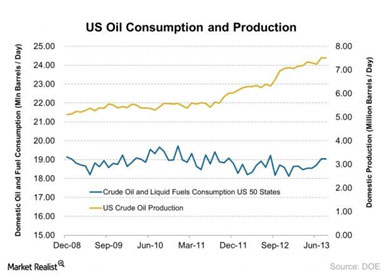Everyone knows a booming economy also means booming oil consumption, right?
It’s a link that needs to be broken and the trend is finally in that direction, mostly because of greater fuel efficiency, but also because of changing demographics and use of ethanol in fuel.
While US gross domestic product grew 3.9% in the third quarter – the strongest growth in over a decade – oil consumption fell 0.3%. Next year, oil demand is expected to rise 0.7%, but the economy will grow four times faster, according to analysts surveyed by Bloomberg.
"Oil demand and GDP growth used to go hand in hand. Now, they’re in some ways almost independent of each other because of investments in fuel economy that tended to break the link," Christopher Knittel, an Applied Economics Professor at MIT, told Bloomberg.

They illustrate the change with this example: In September, Americans consumed 1,178 barrels of oil a day for every $1 billion of GDP – down 33% from 1,760 barrels a day 20 years ago.
Under President Obama, cars are finally getting much better mileage, with new models averaging 25.8 mpg – 27% higher than 2007. By 2016, car manufacturers must reach fleet averages of 35 mpg, and 54 mpg by 2025. For the first time, fuel efficiency standards will reach trucks – the most consumptive, polluting vehicles on the road.
Also, with ethanol accounting for 10% of gasoline, there’s less petroleum in the mix. Then there’s the trend of young people moving to downtown urban areas where they don’t need a car at all, and retiring baby boomers are no longer commuting.
Some analysts see low oil prices accelerating petroleum’s demise: weakening demand, rather than accelerating it. People will use the increase in disposable income to buy more efficient vehicles and airlines will invest in more efficient airplanes, argues economist Philip Verleger, in an interview with Bloomberg.
Unfortunately, that hasn’t happened so far – people are rushing back to SUVs.

We’re more efficient, of course, BUT decoupling of economic growth from resource use isn’t possible. Increasing efficiencies should limit resource use, but in a system based on the relentless pursuit of economic growth, instead lead to increased production/consumption and increased overall resource use. A steady state economy, with stable population and consumption, would be the truly sustainable alternative to economic growth. Efficiency gains would be a crucial part of a steady state economy but, without the growth imperative, would actually reduce resource use. In “Supply Shock” Brian Czech expounds on these ideas, explaining why all sectors of the economy are based on the extraction of natural resources, and that the economy grows as an integrated whole. See http://supplyshock.org.
CASSE, I agree with you about the need to stop endless growth and move to a steady-state economy.